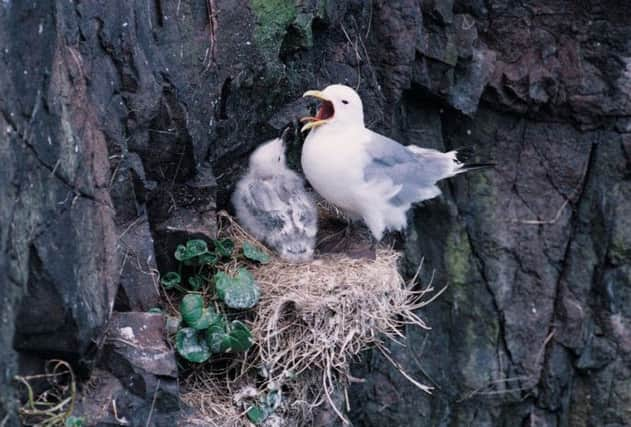Seabirds need us to save the sandeel


It may come as a surprise to many, but the humble sandeel is one of Scotland’s most important species. You are unlikely to see them framed by tartan promoting Scotland as a tourist destination any time soon. That honour is reserved for our more photogenic red squirrels and soaring eagles. Admittedly, sandeels are not much to look at. They are tiny fish that spend most of their life buried in sand, deep beneath the waves, far from the eyes of tourists. However, their silvery shoals support an amazing array of marine wildlife that people do get excited about. Dolphins, porpoises, whales and seabirds all need to feed on sandeels to survive, as do commercially important fish.
While sandeels are the vital prey for species from minke whales to cod, it is our amazing seabirds that are most dependent on a bountiful supply. Climate change is affecting the availability of the food sandeels eat, and as their population has suffered, this in turn has had a knock-on effect on many of our seabirds. A kittiwake’s diet, for example, can comprise up to 90 per cent sandeels, and we have seen the population decline by 68 per cent in Scotland since the mid-1980s. This is a worrying trend that is not confined to one species. Scottish Natural Heritage reported that half of all monitored seabirds in Scotland have been lost over the same period.
Advertisement
Hide AdAdvertisement
Hide AdAs is the case with many important marine species that are in decline, the sandeel population is inadequately protected. The Scottish Government is trying to address this by setting up a network of Marine Protected Areas (MPAs). RSPB Scotland is delighted that the importance of sandeels in the marine environment is being recognised within this network.
However, there are only three MPAs proposed for these fish in the whole of Scotland’s territorial waters. A further vital site in the Firth of Forth has not been proposed for sandeels despite being one of the best known and studied areas for the fish in Scottish waters.
Worryingly, proposals for major windfarm developments overlapping this site are currently being decided on by Scottish Government. Ministers are expected to announce which MPAs will be designated by the end of July, and while we cannot predict which will be chosen, we are hopeful that the three sandeel sites will be selected.
We know that climate change is the big factor in sandeel decline – there is no commercial fishery for the species in Scottish waters – so what can MPAs do to protect these fish from the effects of global warming?
Climate change is a rapid alteration in the environment accelerated by human activity, to which plants and animals will have to adapt to survive. However, it is not the only threat to survival, and this is where MPAs come in. They offer species such as sandeels protection from other threats, for example developments at sea, and allow them to build resilience and adapt to the pressures brought on by climate change.
By having MPAs set up for sandeels, we can hope for a recovery in sandeel populations. If you picture the marine food chain as a giant game of Jenga, then it is looking pretty unstable at the moment. Sandeels have always been the key building block in the marine environment and if the Scottish Government does not act to keep this species safe from the big, podgy finger of climate change, then the delicately balanced structure will come tumbling down. This will mean fewer seabirds, fewer whales, dolphins and porpoises, worse-off fishermen and marine tourism businesses, and a big drop in the number of tourists visiting Scotland. Bear in mind that marine wildlife tourism is worth around £65 million a year to the Scottish economy, and clearly there is a lot riding on MPAs being a success.
Sandeels may not evoke the same feelings as puffins, bottlenose dolphins and minke whales, but their survival and the prosperity of their populations is the linchpin of the stability of the marine environment. We need to see appropriate protection now, before there is nothing left to protect.
• Allan Whyte is marine policy officer at RSPB Scotland
SEE ALSO